| Columns Retired Columns & Blogs |
That extra 1 watt makes all the difference! Those Scandinavians are so precise:-)
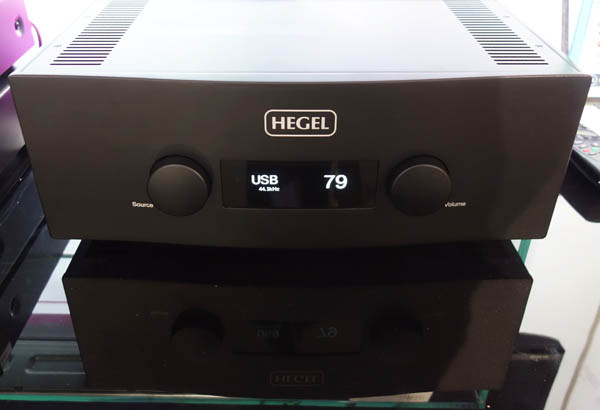
Scheduled to ship in early autumn, the Hegel 590 ($12,000) is poised to become the Norwegian company's new flagship integrated amplifier. With a power supply 50% larger than that of Hegel's previous top-of-the-line integrated (the H360), the 590 operates in class-AB, delivering 301Wpc and maintaining low distortion with a feed-forward system that kicks in as needed. As with previous Hegel products, its D/A section uses a built-from-scratch master clock, rather than an off-the-shelf chip, and it does PCM up to 384kHz, and up to DSD256 (DSD over PCM).
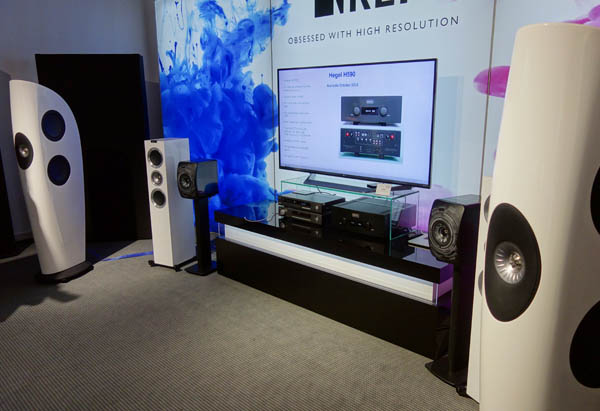
Driving a pair of KEF Blade loudspeakers (ca $30,000/pair), a pre-production Hegel 590 sounded amazing—a really good sense of musical drive, plus a tonal balance that was neither dull nor overly crisp—on a digital file of Shelby Lynne performing the Nick Cave song "Into My Arms." I mentioned to KEF's Johan Coorg how good that and another pop selection sounded, and he pointed to both painstaking set-up work and the addition, at the last moment, of a Nordost Tyr 2 USB interconnect.
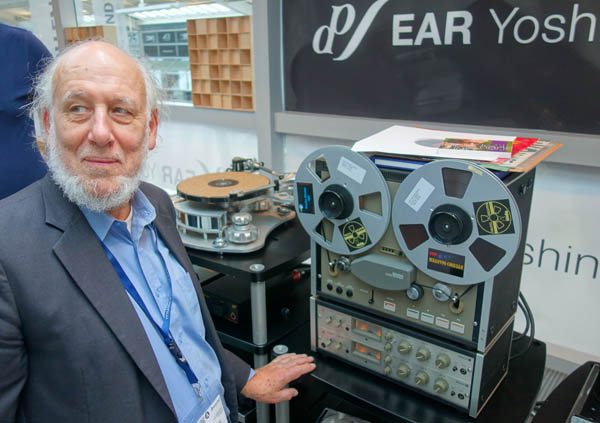
Designer Tim de Paravicini of EAR Yoshino, as well-known among recording and mastering engineers as he is among high-end audio enthusiasts, brought to Munich his modified Denon DH-610S open-reel deck ("I rebuilt the electronics my way," he told me). He also played a number of LP selections, including Bob Marley and the Wailers' "Waiting in Vain," which was cut in 1985 at Island studios, using his electronics. The sound, through a system including a pair of EAR 861 amplifiers—four PL509 output tubes per amp, bridged for mono—and a pair of Graham Audio LS5/8 loudspeakers had a great deal of punch, and remained clean and poised even when the volume was turned up high.
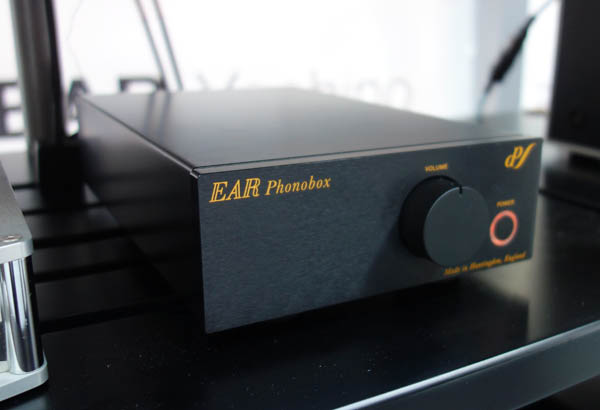
Speaking of vinyl, High End 2018 also saw the debut of the EAR Phonobox, which replaces the much-loved EAR 834 phono preamplifier. The estimated US retail: $1800.
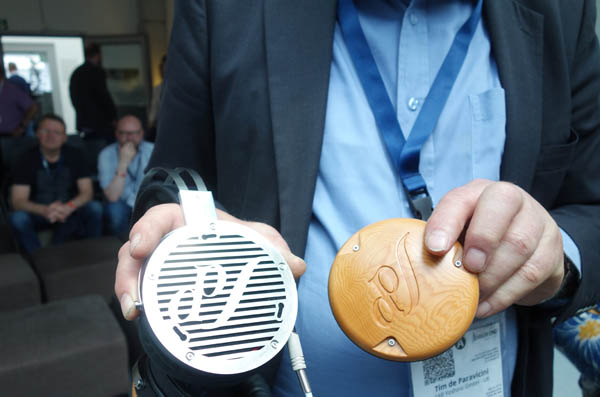
Also coming soon from Tim de Paravicini: the company's first-ever headphones, the removable solid-wood backs of which allow for either open-ear or closed-back use. Tentatively named The EARphones, these are scheduled to go on sale in two months' time, for an estimated price of $1800.
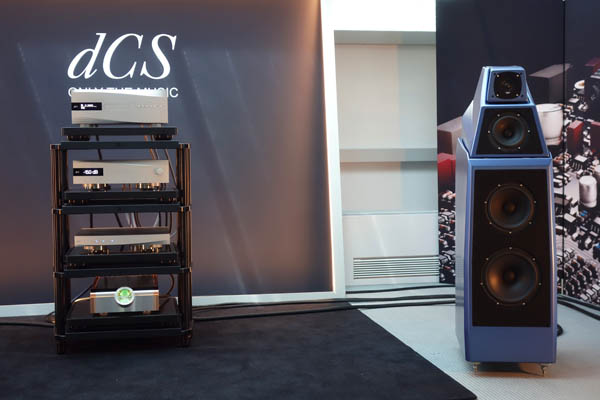
Knowing that Wilson Audio brought to Munich a full three pairs of the company's new Alexia 2 loudspeaker ($65,000/pair; watch for John Atkinson's review in the July Stereophile), and hopeful of hearing at least one of those pairs, I steered toward the room sponsored by digital specialists dCS ltd. My reasoning: on that system, I would also be able to hear back-to-back comparisons of MQA and non-MQA versions of the same music files, derived from recordings made by Wilson Audio's Peter McGrath.
The less controversial of my two take-aways: driven by a Dan D'Agostino Momentum stereo amplifier and fed by a dCS Rossini DAC ($24,000) and Rossini clock ($7500)—the system also included the brand-new Rossini SACD/CD transport ($22,000)—the new Alexias sounded effortless, and harked back to the unapologetically pretty tonal balance of Wilson's Sophia 2 loudspeaker, which until now was my favorite of the brand's creations: I left the room thinking more about the music I had heard than the gear.
The conclusion that may sit less well with some: all of the four abbreviated selections I heard—two different piano recordings, a string quartet, and a recording by Renée Fleming, with Michael Tilson Thomas and the San Francisco Symphony Orchestra, of one of Strauss's Four Last Songs—sounded better in their MQA versions. The two piano recordings seemed to benefit the most—the sense of touch was more apparent, and more human—and although the Fleming-Tilson Thomas file also sounded more focused, musically and spatially, I also admit that the music making was so over-the-top gorgeous that the sonic distinctions, though real and in MQA's favor, mattered less to me. Still, in four out of four cases, MQA's aptly described de-blurring was an unambiguous improvement.
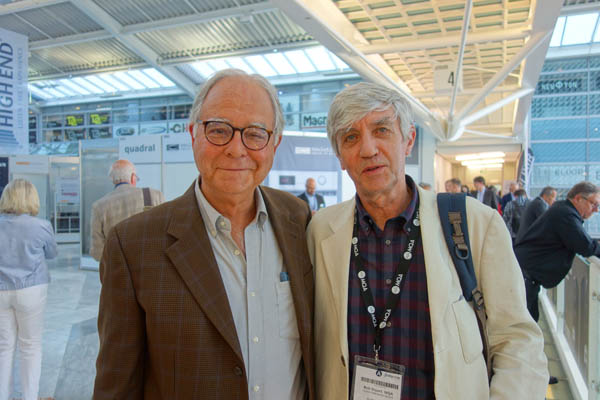
Speak of the devils (just a figure of speech!), here are Peter McGrath of Wilson Audio (left) and Bob Stuart of MQA (right), seen here taking a break from all things audio and chatting about another mutual passion, photography.
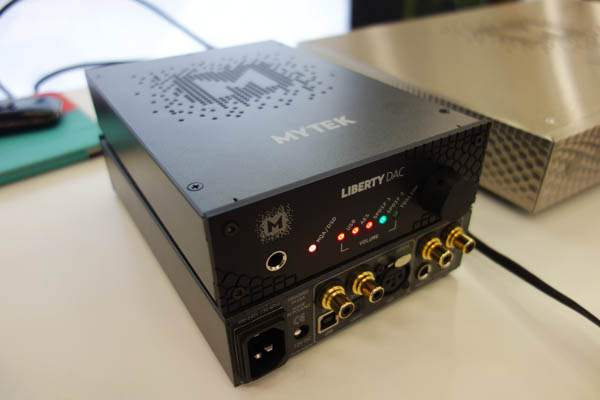
Seen here are two samples—one turned back-to-front—of the new Liberty D/A converter ($995) from Brooklyn's own Mytek Audio. As the company's Adam Bielewicz explained, the MQA-equipped Liberty is essentially the same as the original version of the Mytek Brooklyn, sans phono preamp and front-panel display. JA has a sample in for review.
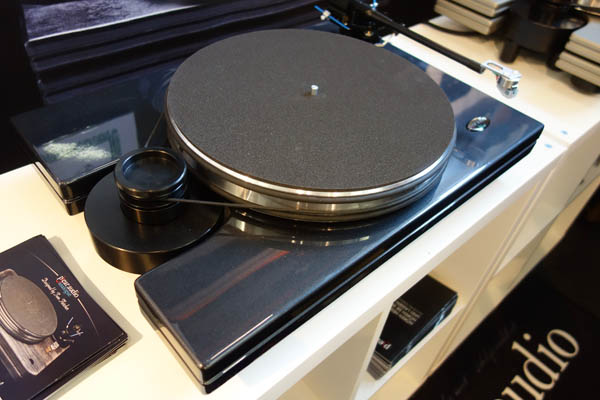
From Pear Audio Analogue came the news that all of their turntable models are now available in custom automotive finishes—seen above is Ferrari Anthracite paint on a Kid Howard model—for a 10% upcharge, compared to the standard wood finish.
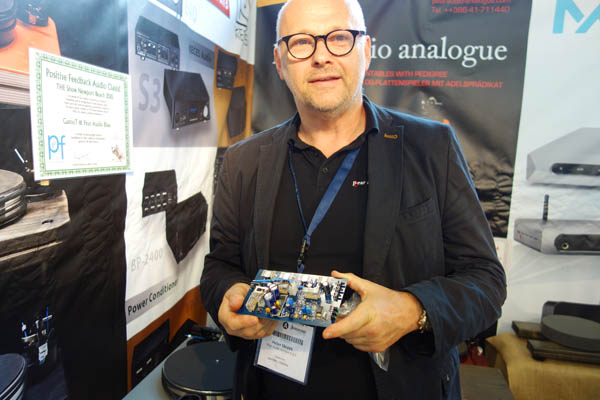
Also on its way from Pear Audio Analogue: a power-supply option that promises improved performance, but for less money than the company's currently available outboard supply. As company founder Peter Mezek (above) explained, "I thought to eliminate the enclosure and put [the new board] in the turntable—carefully isolated, of course—and it performs very well." The release date and projected price have yet to be determined.
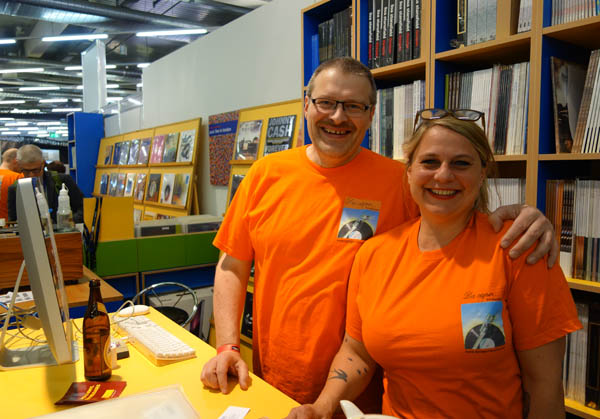
Speaking of vinyl, there were even more LP vendors at High End 2018 than I remember seeing during my last visit, in 2014. Above are the proprietors of Da Capo Schallplatten of Furth . . .

. . . and here is the generously stocked booth of Blue Danube Records, of Tulln, who specialize in used LPs, with an emphasis on classical music. I steeled myself as I approached, determining to wait until the end of my stay before spending any money—but when I saw the sections labeled Decca and EMI, I lost my resolve. Their inventory is now short one LP.

That extra 1 watt makes all the difference! Those Scandinavians are so precise:-)

So precise... but the opposite is true when it comes to informing people where their products are made - China! Just sayin'.


Please get outside your "box" and cover some new brands -- like Cube Audio, Grandinote, Boenicke, etc. I hope the HE 2018 coverage is not like AXPONA -- every magazine/web-site covered the same rooms over and over and over again

a) Neither Grandinote nor Boenicke is new. I've covered both of them at multiple shows. I'm not familiar with Cube Audio. but see no indication on its website that they're in Munich. Maybe they are...
b) None of the brands you mention was at AXPONA.
c) The videos we did at AXPONA took an inordinate amount of time to shoot. As a result, we covered far fewer rooms than we usually do. My coverage, I might add, was determined by floor, not brand. Ditto for coverage from Herb and Jana and John. John was also quite tied up preparing his talk and doing all the things that John must do.
If brands such as EAR, Wilson Audio, and dCS are "in the box," it is because their consistent excellence merits attention. The point of our coverage is not to stay within a safe zone, by any means. Wilson Audio and dCS have already gone through a family line of succession - VPI is another example - and have proven that they are here for the long haul. They are also paradigm setters, and remain so.
Having said all that, I absolutely agree that lesser known brands deserve attention at audio shows. Let's see what Art and Herb come up with in the days ahead. After all, they're looking at hundreds upon hundreds of exhibits. Do keep in mind that it's very hard to hear anything in the huge exhibit halls in Munich, so that most listening will take place in the individual show rooms, which are usually occupied by major brands that you may consider "in the box."

I have not seen any mention of Grimm Audio in the American press. Their speakers are used by Channel Classics:
https://www.grimmaudio.com/info/news/all/all/5594

Guido Tent is a friend of mine - I am a fan of his creations - but until now in Munich I had never heard the fabulous Grimm Audio active loudspeakers. Stay tuned, my show reports will cover Grimm and Boenicke - hopefully by tomorrow

Thanks for letting us know that you will cover Grimm Audio. I had never heard of them until I read the page documenting the equipment used by Channel Classics:
https://www.channelclassics.com/general-info/equipment/

Hi Jason,
We were actually at Axpona in rm. 666. We had Grandinote amplification, a phono stage from Tommy Horning compliments of High Water Sound, a Statement 301 Garrard from Artisan Fidelity with a Supreme-Analog Tangenta Tonearm with a Proteus cart...Audionec or Rockna digital depending upon the day, Boenicke W5 and Grandinote Mach 4 speakers alternating, with racks and LP furniture from Symbol Audio, and Verastarr cables. Sorry we missed you, I always love your writing.
best,
Fred Crane
Prana Distribution LLC

but I am a slow writer. I just now got home and my plan, while at High End, was to cover brands that are not represented at US audio shows -- especially horn loudspeakers !
herb

Tim is a genius and gentleman, long respected him and his products. Desperately want to visit Blue Danube records, the owner whose name escapes me, has told me before how he can recommend hotels for me to stay at and then will provide a tour of his store and where his titles and genres are, after that I can peruse to my hearts content. Heaven! Time to start saving my drachmas.

Thanks for your excellent coverage. Glad to hear you could take a break from your reporting duties to dedicate a little personal time to LP acquisition! Just curious . . . What disc did you scarf up from Blue Danube Records?
Darryl


how it compares to the Karajan with Berlin, assuming you have that fabled recording.

I'd like to get the Klemperer Metamorphosen, but while the 2007 release CD looks like the best bet, it includes a Mahler symphony and the 2 CD's are over $20. I've been looking for a better deal, but no luck so far.

Other options:
http://www.findhdmusic.com/album/richard-strauss-four-last-songs-gundula-janowitz/33162
https://www.primephonic.com/richard-strauss-vier-letzte-lieder-metamorphosen-oboenkonzert
As for Klemperer, Mahler Symphony No. 9 is a magnificent work. You have this choice as a Klemperer alternative:
http://www.arkivmusic.com/classical/album.jsp?album_id=876294

If you haven't read the 9 comments at Amazon on the GROC 2007 edition, then by all means do so. They're as much an adventure in reading as listening to the symphony. Highly recommended.

His 74 or 83 version? Both of which I find magnificent.

74 based on the hyperlink you provided. I’m partial to his 83 version which I find very moving.

I would like to listen to the MQA versions that Art Dudley has listened to. Where can I find these? Thx.

Peter Mc Grath's recordings are private. I don't know about the others. My guess is that, some years back, Peter recorded Fleming and MTT with the New World Symphony in Miami, and that Peter asked Bob to make him MQA versions of those and other tracks of his own making that he loves to play at demos.

...to report on the sound quality of a private recording frankly... I would have expected better.

It certainly should be done differently next time, with disclaimers as appropriate.

Should indeed be evaluated as transparently as possible... Thx.

This means, no rare, out-of-print recordings, no personal recordings made by the sound engineer running the demo, no not-for-circulation master tapes, and probably no demos of master tapes that cost $1000 each...
Beyond all that, how is someone demonstrating their own private recordings not transparent? You're hearing two versions, and your ears are doing the listening. When Peter conducted an MQA / non-MQA demo at AXPONA, I asked him to play the MQA (A) version first, because studies have shown that in A/B demos, people invariably prefer B because they hear more detail when they're mores accustomed to the recording the second time around. Yet people in the room still consistently preferred the MQA (A) version.
Now, it might be one thing if Peter Mc Grath or John Atkinson or Morten Lindberg (whose MQA recordings are available commercially) or David Chesky (whose MQA CDs are available commercially) had a financial stake in MQA. But they don't. So unless you have some legitimate reason to question their integrity, this argument makes no sense to me.
If you want to use commercially available recordings compare MQA / non-MQA on the dCS Rossini, download any recording from 2L's Morten Lindberg in two versions: native 24/352.8 (DXD) for all his most recent recordings, and MQA. Be sure to set the Rossini's automatic upsampling to DXD, because that will mean that you'll hear Morten's DXD track without upsampling. You can also play with the PCM filters on the Rossini to your hearts content. And, whenever the Rossini 2.0 upgrade is released, you can do the experiments all over again.
Your other choice is to compare recordings on Tidal. In that case, you'll compare upsampled PCM to MQA.

I don't know about financial stakes, not my comment here. I would, however, like to reproduce and judge for myself. Truth be told I have listened to a lot of MQA over TIDAL (Rossini+Clock>Ongaku>Avantgarde Duo Mezzo) and some of it is great, some of it the same, some of it not as good compared to other sources. So every time I hear a comment on MQA, I want to try it for myself. I agree private recordings are fine to audition, but MQA - and its loads of fan, detractor and agnostic crowds - do require more care in my opinion.

I downloaded just about everything from 2L. Some of it sounds great. I did not find, for example, that the MQA version of Arnesen's Magnificat was any better (and possibly not as good) as the 358KHz PCM - which I purchased. Stunning piece btw...

Thank you for your reply.
I think the biggest shock for me in comparing MQA / non-MQA tracks of recordings by Lindberg, Johnson, Chesky, Mc Grath, and Atkinson is that even the most vaunted of A to D converters has inherent timing errors that, to my ears, MQA seems to correct. Naysayers will tell me that I'm hearing something else, or that I'm just too deluded or delusional to notice that I'm being duped by the MQA cabal. Either that, or I'm a shill for MQA. There's no way to argue with that, since they clearly know me better than I know myself.
I must check out the Arneson. Thank you for that.
If you lived near Port Townsend, WA, I'd be happy to invite you over for some comparison listening. I've hosted the PNWAS three times now.

At Jim Austin's footnote to his current article on MQA, and see the reference to 2L's early MQA files, and how they improved. I don't know if this relates to your listening comparisons, however.

It was interesting. Ultimately my conclusion was high res mastered well does not benefit from MQA on average. There are some examples where MQA versions sound better - Keith Jarrett's "Koln Concert", Amy Winehouse's "Back to Black" (which is less distorted in the MQA version compared to my 24/96). But there are a vast set of recordings where MQA does not make a meaningful difference - it is often a little different but not necessarily better. In my view, to be honest, the most value of MQA for me is the careful remastering rather than the technology itself. I think with such remastering you ought to get as good or better a result out of standard PCM (say 24/192) than MQA. That's my impression after so much listening to MQA on TIDAL.

When I read the detailed article on how the MQA people remastered the Radka Toneff Fairytales album, I thought "wow!" - if only we could get that kind of hands-on remastering for all albums. But looking around the industry at large, it seems we get those labors of love only for a handful of very popular pop and jazz albums, and maybe do better on classical albums (but don't really know).
The interesting and mysterious thing about MQA, from my point of view, is that they're "remastering" thousands of albums for MQA, probably in an automated or semi-automated process, where I assume there's little or no hands on. That's worrisome.

I do appreciate that, so what I'm saying is basically the more hands-on there is, even if briefly, the more chance there is for the recording issuer to say "Oops - wait a minute, this particular album might need a little more tweaking." In other words, if someone is listening and they discover that a particular MQA master isn't providing a better result due to limitations in the original, they might want to move that job to the hands-on queue before releasing it, just to see if it's feasible to add some improvement.

Albums done in batch (the vast majority of the 8,000 or so albums) are a wash. The Keith Jarrett one is an example, and so is Amy Winehouse’s - clearly done carefully and you can definitely tell. Others not so much. Examples: INXS’s “Kick” - the latest redbook remaster is superior to the MQA version, Morrisey’s “Viva Hate” is just as flat-sounding on redbook as it is on MQA. A few albums I would expect were done individually (eg Aretha Franklin’s “I never Loved A Man The Way I Love You”) sound about the same in MQA vs high res versions. So there...

Just in case someone tells me I’m listening on a boombox or something...
http://goo.gl/66fjxw

That's a lot of glass there...

With shades down (made of a permeable material) it is less noticeable. Also the glass is at an angle, so the bass modes are much less well defined.

...and determining if more careful treatment is required is tall order. And when such treatment is required, how to improve it is also pretty hard to do...

Just to clarify, I wouldn't expect any tweaking or improvement of the MQA process itself during mastering - that process I would expect to be a canned algorithm. What I think should happen though is when making an MQA master, assuming the intent is actually making a better sounding master (and not just applying the codec and sticking the MQA label on it), the expert(s) should 1) Compare it to the best master they already have (to make sure it doesn't sound worse), and 2) Listen as objectively as possible for a couple of minutes and ask themselves "Are we putting lipstick on a pig here, or should we do some more work on this recording *before* we apply the MQA codec?"

Just do this math: About 8,000 albums in MQA (prob 9,000 to 10,000 today). A year has ~252 weekdays (ignore holidays and vacations). Assuming the work has been done over 3 yrs (it's very likely shorter) it would require to deliver 11 albums per day. My understanding is MQA encoding happens at MQA Ltd, nowhere else. So it's simply not possible to have a careful treatment of just about any album.

Your numbers are OK, but when you consider how important a popular album is, 11 per day at only 5 minutes per is not too much to ask of the engineers. The bigger issue is what they're supposedly accomplishing, and running a bunch of so-so masters through their meatgrinder to polish off the rough edges with MQA - the part of the public who care about quality will eventually get wise to that scam (based on the best info I have).
I imagine the demographics like this: Those who aren't audiophiles won't care and won't notice, unless someone starts a social media movement to inform them that they have to pay higher fees for a non-product. Those who do care will have to pay more, regardless of what they get. So we will pay more and get pretty much what we're getting now, and for those who are cash-strapped, they'll need to settle for only 2 versions of the Bruckner 8th instead of the 10 versions they'd like to have.

Doing a white glove treatment cannot take 5 mins. Listening itself cannot take 5 mins. That doesn't work. I would guess something on the order of 200-300 albums might have taken a non-bulk-processing approach.
My impression is the MQA sound difference comes to a great extent from judicial use of eq, digital tweaks, peak restoration, etc, much like the work in the Fairytales album (though not as detailed obviously or we would have a total of ~10 albums). You can clearly see this in Amy Winehouse's "Back To Black" where there is clearly some distortion removal (perfectdeclipper-like).
I don't see MQA becoming yet another download or CD format (what MQA CD means is yet another mystery to me as CDs are 16bit). If MQA becomes a thing, it will only be in the streaming realm, I think.

Just saw this on TIDAL - the redbook was there, but the MQA version is now there as well. Will check it out tonight.

Good restoration job. Unfortunately I find the music uninteresting to be honest.

Good restoration job. Unfortunately I find the music uninteresting to be honest.

Categorized as Jazz usually, for lack of a more accurate genre - it's a very well done introspective for an individual who struggled with personal demons and then committed suicide. There are lots of highly personal recordings around, few of which are as well done, but in any case you just have to get your head into it if you can, to enjoy the music. For me, the difference between this and similar recordings is the quality - I can replay this occasionally where others wouldn't wear as well due to low quality sound or technique.

Vs other versions? BTW, I purchased the MQA version after reading all the work that went into it. I thought it was very interesting to own and reward for the work even if it's not my favorite album.

The MQA version is clearer and better, but I'm not at all surprised at that given the age of the original, and the fact it wasn't (as far as I know) a big release that got the best engineering of that day. If it did, something went wrong. The promotional aspect of this album is the MQA label, but it's not MQA that made the difference. I have a few other MQA albums released in MQA and non-MQA at the same time, and there's very little if any discernible difference.
I don't want to beat the dead horse, but I'd like to suggest to the MQA people that they're not going to build a great legacy for themselves merely by sticking a label on something that got a fancy filter applied to it. Even audiophile companies like MFSL cut corners a few times and thus suffered a bit of prestige loss, and MQA's distinction as an audiophile company is somewhat dubious.
I did quite a few searches for MQA downloads a couple months ago, and the few sites (or only site) with a good variety of MQA-encoded downloads wanted at least 20-25 percent more for those compared to the high-res downloads. If they were new masterings that were more than just the codec applied, they might be worth it. A good recording is worth good money I think. But if I don't get clues that that's the case, so I have at least a 50-50 chance of getting a better quality version of the album, why bother?

(My last post got cut off ... continuing)
I bought a remastered CD of the Clapton Layla album a few years ago, and it was much improved over any older copies I've heard. I had a chance later to sample a high-res copy of that remaster from HDTracks ($35 was their price), and it was no better than the $15 CD, mainly because the original master was low quality and very noisy, and miracles are hard to come by. I did buy a remastered download of an Aretha Franklin greatest hits from HDTracks, and it was obviously improved over older versions, but in that case it wasn't a double album with a lot of filler, so I didn't mind the extra few dollars over the CD price. The Aretha album also suffered from poor recording quality and high noise, so that download would not be better than the corresponding CD.
Those are things that come to mind when buying MQA versions of almost anything.

I was less than impressed (to put mildly) by what I heard at the show. The same for Stenheim. And at the very bottom of the scale was the horrific Silbatone room, where dozens of highly attentive ears listened to an heavily distorted Christmas song.

Nice coverage Art, thank you. I was wondering, whilst you were in the EAR Yoshino room, did you happen to notice what kind of cables Tim was using? I just exchanged my Naim SuperNait 2 + Supercap DR for a nearly new EAR Yoshino V12 and I'm looking to replace all my current cables, Naim Super Luminas and Power-Lines as well.